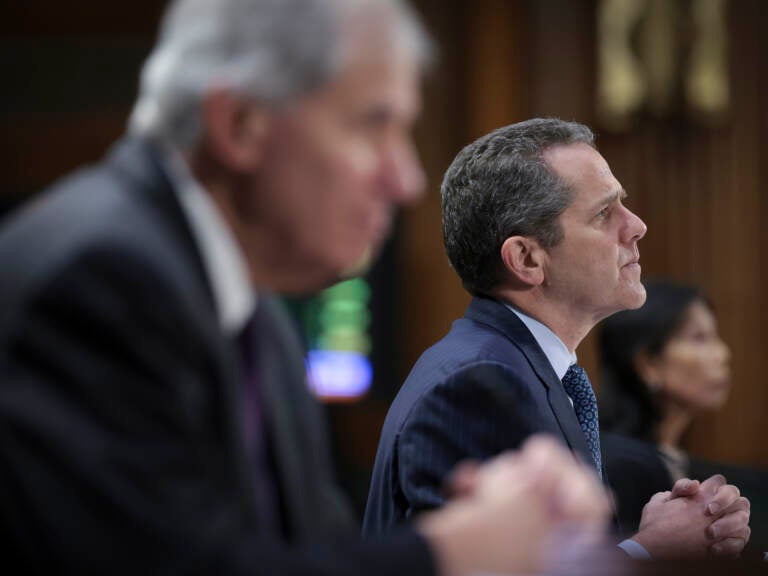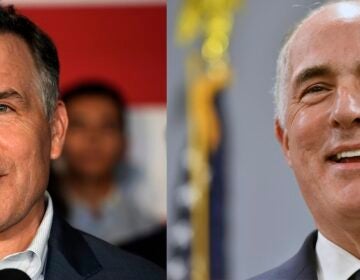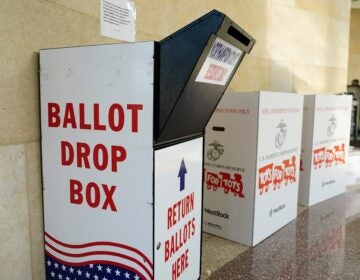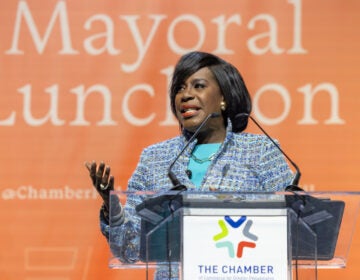5 things we learned from the Senate hearing on the Silicon Valley Bank collapse

Federal Reserve Board Vice Chair for Supervision Michael S. Barr (R) appears before the Senate Banking, Housing and Urban Affairs Committee March 28, 2023 in Washington, DC. The committee heard testimony on the topic of 'Recent Bank Failures and the Federal Regulatory Response.' (Photo by Win McNamee/Getty Images)
Days after one of the largest bank failures in U.S. history, the fallout continues.
Some of the country’s top banking and financial regulators appeared before the Senate Banking Committee on Tuesday to testify about what led to the downfall of Silicon Valley Bank – and how to prevent the same thing from happening elsewhere.
The collapse of the SVB, along with Signature Bank, has sparked scrutiny of the roles played by both bank managers and regulators. Policymakers will be debating whether new laws, rules, or attitudes are needed to keep other banks from going under.
Here are five takeaways from Tuesday’s hearing:
Silicon Valley Bank’s management messed up
Regulators had some tough words about SVB’s management at the hearing.
Silicon Valley Bank more than tripled in size in the last three years, but its financial controls didn’t keep pace.
The government bonds it was buying with depositors’ money tumbled in value as interest rates rose, but the bank seemed unconcerned by that.
“The [bank’s] risk model was not at all aligned with reality,” said Michael Barr, the Federal Reserve’s vice chair for supervision. “This is a textbook case of bank mismanagement,”
The bank recognized the problem only belatedly and tried to raise cash by selling some of its bonds at a loss earlier this month. That merely alarmed depositors, sparking an unusually rapid run on the bank.
Regulators issued warnings, but the problems were not fixed
How much blame should be laid at regulators feet? That was a question that cropped up repeatedly during the hearing.
Barr stressed that federal regulators had repeatedly warned the bank’s managers about the risks it was facing, at least as far back as October 2021. The bank was served with formal notices documenting “matters requiring attention” and “matters requiring immediate attention.”
But the risks remained and the Fed stopped short of ordering changes, which frustrated some of the senators in the Senate Banking Committee from both sides of the aisle.
“It looks to me like the regulators knew the problem, but nobody dropped the hammer,” said Sen. Jon Tester, D-Mont.
The problems developed during a time when the Fed was generally pursuing a light touch in bank regulation. In 2021, for example, the Fed issued a rule — at the urging of bank lobbyists — noting that guidance from bank supervisors does not carry the force of law.
That led some senators to call out colleagues who pushed for lighter rules, only to turn around and blame a lack of regulatory muscle for the bank’s failure.
“We’ve got a lot of folks that had been saying for months and years, ‘let’s rein in the bank supervisors,’ and now all of a sudden, it’s like, ‘Where were the supervisors? Why weren’t they being more aggressive?,'” said Sen. Chris Van Hollen, D-Md.
Barr is leading a review of the way the Federal Reserve supervised both Silicon Valley Bank and Signature Bank. His report is expected by May 1.
Modern bank runs can happen really fast
In their testimony, regulators also stressed the speed at which the banks collapsed.
When big depositors got wind of the problems at Silicon Valley Bank, they raced to pull their money out, withdrawing $42 billion in a single day.
“That’s an extraordinary pace and scale,” Barr said.
The bank scrambled to borrow more money overnight, but it couldn’t keep up. By the following morning, depositors had signaled plans to withdraw another $100 billion — more than the bank could get its hands on, according to Barr.
“They were not able to actually meet their obligations to pay their depositors over the course of that day and they were shut down,” Barr said.
Other banks will pay for the failure, but maybe not all banks
Also under scrutiny throughout the testimony, was the federal regulators’ decision to backstop all deposits at SVB as well as Signature Bank.
Silicon Valley bank was taken over by the FDIC on March 10, but fears of a more widespread bank run led regulators to announce days later they would guarantee all the deposits at both SVB and Signature Bank, not just the $250,000 per account that’s typically insured.
Making customers whole is expected to cost the deposit insurance fund $20 billion for Silicon Valley Bank and $2.5 billion for Signature Bank.
By law, that money will come from a special assessment on other banks — and that’s left many senators unhappy.
“Wyoming’s community banks may end up paying for this,” complained Sen. Cynthia Lummis, R-Wyo.
FDIC Chairman Martin Gruenberg stressed that the agency has some discretion in how those insurance costs are divided up among different categories of banks. A recommended formula will be announced in early May.
Bank executives could pay
The role of SVB’s top executives came under scrutiny as well during the hearing.
Lawmakers expressed frustration at reports that executives at Silicon Valley Bank sold stock and received bonuses shortly before the bank’s collapse.
Although the government doesn’t have explicit authority to claw back compensation, it does have the power to levy fines, order restitution and prohibit those executives from working at other banks, if wrongdoing is found.
“Almost every American would agree it’s simply wrong for the CEO and top executives to profit from their own mismanagement and then leave FDIC holding the bag,” Van Hollen said.
President Biden this month urged Congress to pass legislation to increase the penalties on bank executives when mismanagement leads to bank failures, though it’s unclear whether lawmakers will act.




